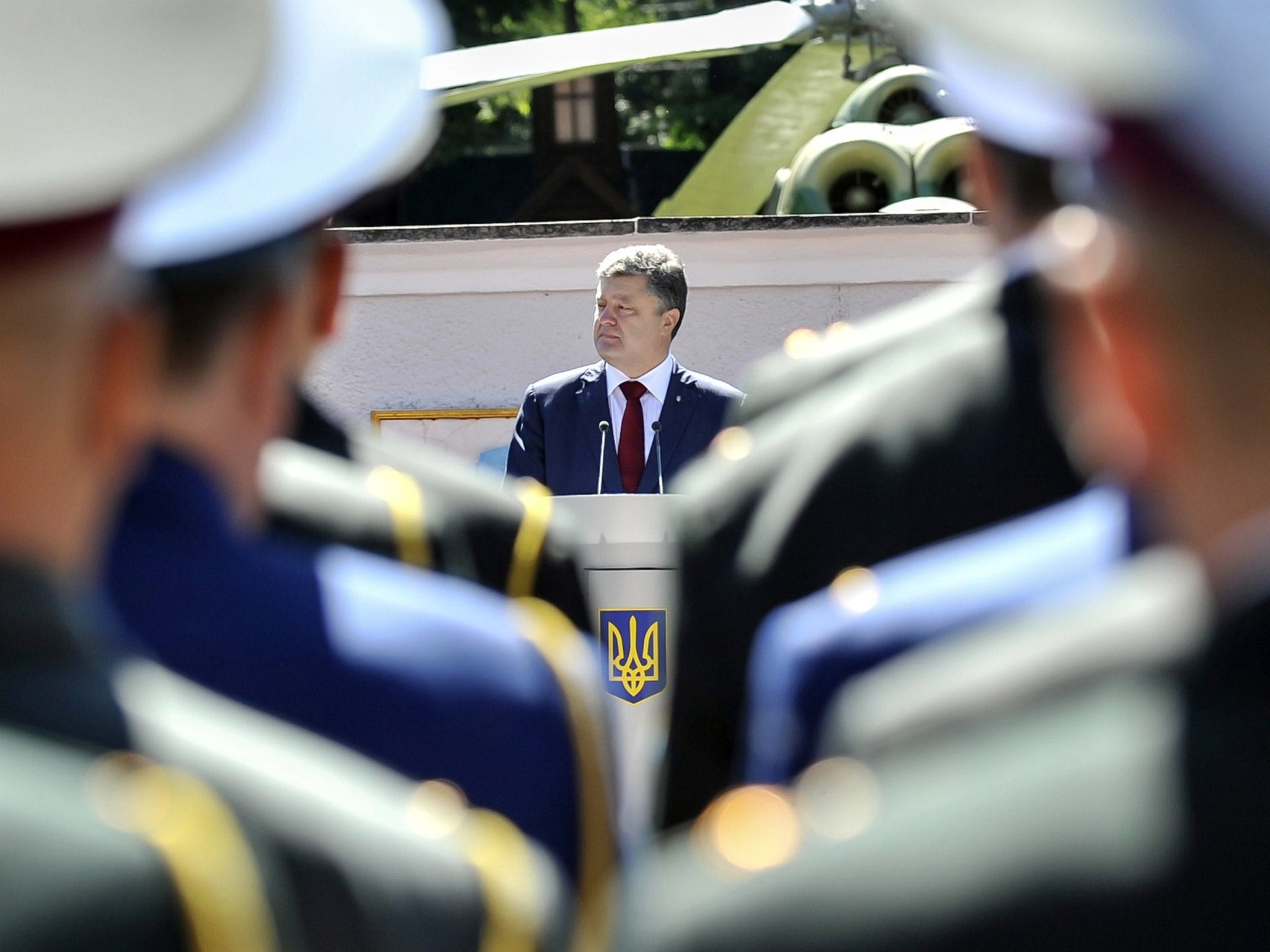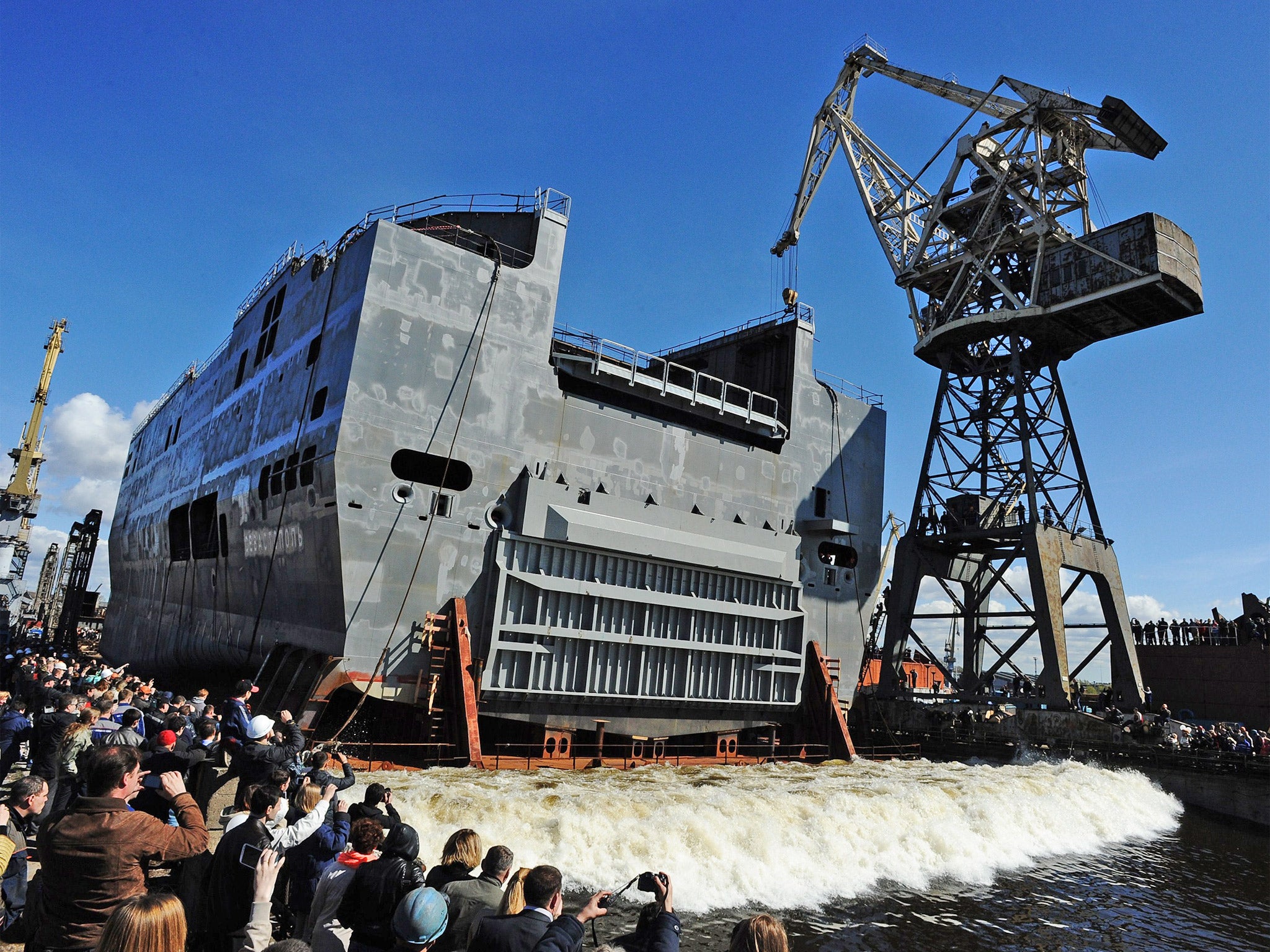Ukraine crisis: Why Europe’s most powerful nations are struggling to balance economic and political considerations regarding Russia
The West was united in its condemnation of the annexation of Crimea – and yet still sells arms to the country that carried it out. Michael Birnbaum reports from Moscow on the moral quandary facing cash-strapped EU leaders

Your support helps us to tell the story
From reproductive rights to climate change to Big Tech, The Independent is on the ground when the story is developing. Whether it's investigating the financials of Elon Musk's pro-Trump PAC or producing our latest documentary, 'The A Word', which shines a light on the American women fighting for reproductive rights, we know how important it is to parse out the facts from the messaging.
At such a critical moment in US history, we need reporters on the ground. Your donation allows us to keep sending journalists to speak to both sides of the story.
The Independent is trusted by Americans across the entire political spectrum. And unlike many other quality news outlets, we choose not to lock Americans out of our reporting and analysis with paywalls. We believe quality journalism should be available to everyone, paid for by those who can afford it.
Your support makes all the difference.The French are sending helicopter carriers. Germany constructed a hi-tech military training facility. And the Italians have been shipping armoured vehicles.
Deep into a crisis in which Russia’s military deployed on Ukrainian soil, European nations have been struggling to balance economic considerations with political ones. Now France is poised this month to invite 400 Russian sailors to train on a massive new ship that a Russian admiral once said would have enabled his nation to beat neighbouring Georgia in its 2008 war in “40 minutes instead of 26 hours”.
French leaders have refused to cancel the $1.7bn (£1bn) sale of two Mistral-class helicopter carriers – capable of transporting 16 attack helicopters, dozens of tanks and 700 soldiers – despite Russia’s annexation of the Crimean Peninsula in March.
The Mistral deal and other arms shipments lay bare the difficulty of applying pressure on Russia, even at a time when tensions between the country and the West are at their worst since the Cold War.
European leaders have sought to protect their defence industries even as they have sanctioned Russian officials over the Crimea annexation.
“We are executing the contract in full legal compliance because we’re not at that level of sanctions,” explained the French President, François Hollande, this month. If sanctions escalate, he said, France may hold back on sending the ships.
President Obama said: “I have expressed some concerns, and I don’t think I am alone... I think it would have been preferable to press the pause button.”
Still, no nation has stepped forward with money to help France avoid shouldering the financial burden of any cancellation alone. That, too, demonstrates the difficulty of achieving a unified Western response to Russia’s actions in Ukraine.
Just a few years ago, Russia’s military almost never bought equipment made outside the Soviet bloc. Even today, Russia remains a major arms exporter. But after Russia’s brief war with neighbouring Georgia in 2008, its leaders rethought their old habits. Although Russia ultimately prevailed in that conflict, soldiers proved ill-equipped and disorganised, struggling with Soviet-era equipment that failed them on numerous occasions. So leaders turned to the West to boost their capabilities.
“At the highest level they found that the Russian equipment didn’t live up to their expectations anymore,” said Pieter Wezeman, a senior researcher at the Stockholm International Peace Research Institute (Sipri), which tracks arms transfers. The Russians began “buying not just complete weapons systems but also technology,” he said.
They found a Continent that was eager to oblige. The 2008 global financial crisis and Europe’s subsequent economic struggles made politicians desperate for any chance to boost their country’s jobs and exports.
Although precise figures are shrouded in secrecy and difficult to compile, France was the most enthusiastic trading partner, analysts say. Germany, Italy and the Czech Republic have also been involved in selling equipment to Russia in recent years, according to data compiled by Sipri. The sales involve aircraft, armoured vehicles and communications supplies.
French deliveries of arms and defence equipment to Russia tripled in value between 2009 and 2010, then kept increasing, according to French parliamentary reports, and the 2011 Mistral deal – which more than 1,000 jobs depend on – furthered this trend.
Russian President Vladimir Putin said this month that if France follows through on the ships, more Russian orders may soon come, a potentially attractive proposition for Mr Hollande, who has presided over a stagnant economy.
“If everything goes as we agreed, we will not rule out the possibility of further orders, and not necessarily in naval shipbuilding. They may concern other sectors as well,” Mr Putin told French journalists ahead of a trip to Normandy this month. “Overall, our relations in this area are developing well, and we would like to continue strengthening them – in aviation, shipbuilding and other sectors.”
The two Mistral-class carriers give broad new capabilities to the Russian navy, analysts said. The first ship, the Vladivostok, will be delivered to Russia in the fall. “The Mistral brings a new concept, a new philosophy of maritime war,” said Alexander Golts, a leading Russian defence expert.

Russia has also purchased 60 armoured personnel vehicles from Italy, according to Sipri figures, along with new electronics and radio systems to upgrade military aircraft.
A $163m hi-tech military training facility built in Russia by the German defence contractor Rheinmetall was near completion when the German Economy Minister, Sigmar Gabriel, halted work on it in March, citing the situation in Crimea. Whether work will resume remains unclear.
The exports from Europe have been critical to the Russian military’s efforts to modernise, said Igor Sutyagin, a Russian military expert at the London-based Royal United Services Institute. “It’s rather difficult to build any modern system without using Western parts,” Sutyagin added. Russia is interested in Western electronics, computing and command-and-control systems, he said. “Russian electronics are still lagging behind the West, and they are very, very important.”
He added that the communications systems of the Mistral may be particularly useful to Russia, since they can be studied and recreated elsewhere. In France, where the government of President Nicolas Sarkozy signed off on the deal in 2011, Mr Hollande is going through with the sale without major domestic opposition. “The issue is monetary, first and foremost. But it’s also one of reputation,” said Etienne de Durand, the director of security studies at the French Institute of International Relations. “It’s kind of difficult when you’re in the business of selling arms to cancel any kind of sale.”
Today, after a late-night call with Mr Putin, the Ukrainian President, Petro Poroshenko, set out proposals for a peace plan for eastern Ukraine involving a unilateral ceasefire by government forces. Speaking to students at a military institute in Kiev, Mr Poroshenko outlined a 14-step plan, including an amnesty for separatists who lay down arms, and tighter controls over Ukraine’s border with Russia. The acting Defence Minister, Mykhailo Koval, told journalists that the ceasefire “will happen in the next few days”.
© Washington Post
Football in a war zone: England’s Ukraine date
The eyes of the world may be on Brazil’s World Cup as England face Uruguay, but on Thursday England’s women footballers fly into Ukraine, amid security concerns, for a World Cup qualifier.
Victory in Lviv, in Ukraine’s north-west where violence has erupted in recent weeks, will clinch England’s place in Canada in 2015 if Wales fail to beat Belarus. England are expected to fly in and out of Ukraine on the same day.
Coach Mark Sampson said: “We’re expecting a tough encounter.”
Join our commenting forum
Join thought-provoking conversations, follow other Independent readers and see their replies
Comments